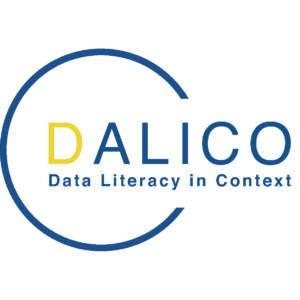Results from the DaLiCo project
During the project five interconnected activities haven been developed. All results are being presented here; the development of each result is explained in each result description.
IO 1: DaLiCo App
DaLiCo App is an integrated Web-application. It consists of a searchable collection of references of curated data literacy resources provided and regularly updated by the DaLiCo members. The resources are indexed with descriptors from a controlled vocabulary (DaLiCo Glossary) and assigned to categories from the DaLiCo Dimensions. > Access to the DaLiCo App
- DaLiCo App > IO1-DaLiCo-App
The DaLiCo References result is part of the integrated Web-application DaLiCo app.
- DaLiCo References > IO1-DaLiCo-References
IO 1: DaLiCo Glossary and Dimensions
The DaLiCo Glossary is a collection of relevant key concepts in the field of data literacy (education) developed in cooperation with the partners from the DaLiCo project. DaLiCo Glossary is structured as a thesaurus following the DIN ISO 25964-1:2011. > Access to the DaLiCo Glossary
- DaLiCo Glossary > IO1-DaLiCo-Glossary
Integrated part of the Glossary is DaLiCo Dimensions, a suggestion for basic dimensions for the description of generic data literacy competences in the field of higher education. The dimensions address 6 core competencies (Data identification, Data understanding, Data use, Data reflexivity, Data managing, Data communication) roughly oriented towards the data life cycle. > Access to the DaLiCo Dimensions
- DaLiCo Dimensions > IO1-DaLiCo-Dimensions
- DaLiCo Map Intermediate Report – Part 1 summarizes the most recent discussion on the concept of data literacy > IO1-IntermediateReport-Part1
IO 1: DaLiCo Data Literacy Knowledge Map
This result introduces the Data Literacy Knowledge Map as format/method for self-assessment and self-reflection on data literacy competencies. With the Data Literacy Knowledge Map, we apply methods of structuring and visualising a person’s information horizon as used in information behaviour research to the exploration of one’s own data literacy. This method can be used in the context of teaching, self-paced-learning, training or train the trainer courses.
- Presentation from lesson on data literacy, and knowledge map exercise during the DaLiCo Summer School 2022 > IO1-Workshop-DL-KnowledgeMap-2022
DaLiCo Map Intermediate Report – Part 2 presents the results of research conducted as part of Intellectual Output 1 to identify gaps and needs in data literacy.
- DaLiCo Map Intermediate Report – Part 2 > IO1-IntermediateReport-Part2
IO 2: DaLiCo Train the Trainer Programme
This result introduces the DaLiCo Train-the-Trainer programme in the field of data literacy. It consists of a methodological framework which is built up in a modular structure in an e-learning environment. The e-learning course is supplemented by an online handbook which provides tools to enhance the methodological framework of the trainings. Both the Handbook and the e-learning course are openly available.
- DaLiCo Train-the-Trainer Programme > IO2-Train-the-Trainer-Programme
Valencia Data Literacy MOOC is a contribution from Universitat Politècnica de València to IO 2 within the DaLiCo project. > Access to the MOOC
- Valencia Data Literacy MOOC > DaLiCo-DL-MOOC-Valencia
IO 3: DaLiCo Virtual Learning Space
As result of IO 3, a virtual data literacy learning space for students has been created in the form of a prototype for an e-learning course. This learning space is the result of the cooperative project work of the DaLiCo partners. Concept, development, design, and use are described. > Access to the course
- DaLiCo Virtual Learning Space > IO3-DaLiCo-Virtual-Learning-Space
The DaLiCo Learning Space Canvas Model was developed within the process of this IO.
- Description to DaLiCo Learning Space Canvas Model > IO3-DaLiCo-LearningSpaceCanvas
- Template of DaLiCo Learning Space Canvas Model > DaLiCo_LearningSpace_Canvas
Learning objectives for the learning space have been formulated during the process of this IO. These objectives can be used as example by other HE institutions to plan data literacy learning spaces.
- DaLiCo Learning Objectives > IO3-DaLiCo-Learning-Outcomes
IO 4: DaLiCo Data Literacy Assessment
The Data Literacy Assessment is developed by the stakeholders of the DaLiCo project. The aim of the assessment is to provide insights in the level of data literacy as starting point for measuring and improvement.
- DaLiCo Data Literacy Assessment > IO4_DaLiCo_Data-Literacy-Assessment
Report of the research which was conducted within the framework of the DaLiCo project to conceptionalize the Data Literacy assessment tool.
- Research Results for Data Literacy Assessment > IO4-ResearchResults-DL-Assessment
IO 5: DaLiCo Implementation Manual
This document is the Implementation Manual and shows the essentials of the concept how to introduce Data Literacy content at a university.
- Data Literacy Implementation Pilots in the Participating Universities > IO5-Manual-PilotConcept
Summer Schools
Three summer schools were conducted as Learning Teaching Training (LTT) Events within the DaLiCo Project. The results and lessons learned are presented in form of a concept for transfer. This concept can be used by other HE institutions to plan data literacy training events.
- Concept for virtual Summer School > DaLiCo-Concept-virtualSummerSchool
- Planning Document for virtual Summer School > DaLiCo-Planning-virtualSummerSchools
